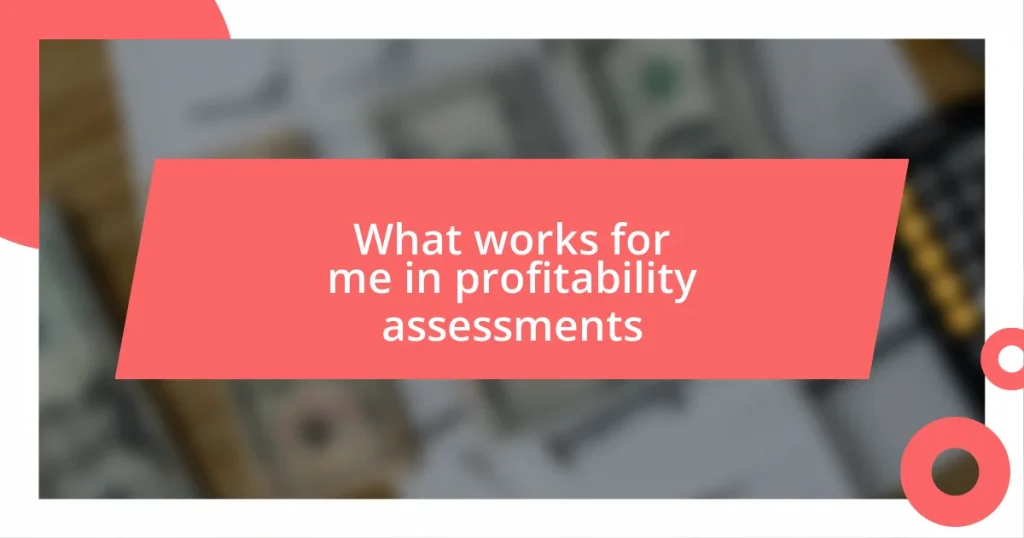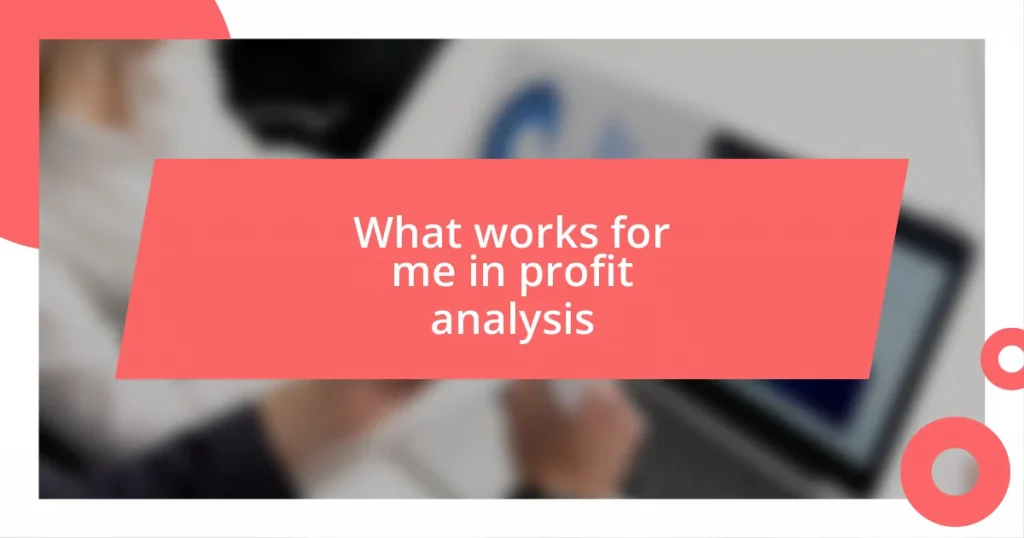Key takeaways:
- Tax compliance involves understanding complex regulations, not just paying taxes, highlighting the emotional toll of mistakes.
- Common issues like inaccurate information and missing deductions can lead to penalties; proactive planning and consulting professionals are essential.
- Audits should be seen as learning opportunities; preparation and reflection can enhance tax practices and foster confidence in compliance.

Understanding Tax Compliance Issues
Tax compliance issues can feel overwhelming, especially when you’re navigating the complexities of forms, deadlines, and ever-changing regulations. I remember a time when I was buried under a mountain of paperwork, unsure about whether I’d filled everything out correctly. It made me wonder—how many others felt the same weight on their shoulders?
When I first started my journey, I often questioned what exactly constitutes compliance, thinking it was merely about paying taxes owed. In reality, it’s about adhering to a myriad of laws and regulations that seem to shift like sand. I recall one instance where a missed deadline led to a surprising penalty. It struck me that understanding the rules is as vital as the act of filing itself. Have you ever had a similar experience where a tiny oversight turned into a significant issue?
What surprised me most was the emotional toll these tax challenges can take. A simple mistake can linger in your mind, creating a cloud of anxiety that’s hard to shake off. I often found myself lying awake at night, wondering if I had crossed all my t’s and dotted my i’s. It’s so much more than just numbers; it can disrupt your peace. Have you ever felt that rush of dread when thinking about your taxes? It’s a feeling I wouldn’t wish on anyone.

Identifying Common Tax Compliance Problems
Recognizing common tax compliance problems can be crucial to avoiding unnecessary penalties. One significant issue I encountered was failing to keep track of deductible expenses. I learned the hard way that not all expenses are straightforward. They require meticulous record-keeping. It’s easy to overlook a receipt or misinterpret a deduction, which can lead to costly mistakes down the road. Have you ever found yourself uncertain about what qualifies as a deductible expense?
Another common stumbling block is inaccurate information on tax returns. I once submitted a form with a simple typo in my Social Security number, and it triggered a cascade of complications. The resulting delay in processing created undue stress. It impressed upon me the importance of reviewing documents multiple times. It’s funny how an error that seems minor can snowball into serious consequences, isn’t it?
Lastly, I frequently encountered issues related to misinterpretation of tax laws. Tax codes evolve, and staying updated can feel daunting. There was a time I misclassified my business income due to outdated knowledge, resulting in an unexpected audit. I realized that proactively seeking help, whether from professionals or reliable resources, can save you a lot of headache. It makes me wonder—how often do we ignore the need for guidance until it’s too late?
| Common Tax Compliance Problems | Impact of the Issue |
|---|---|
| Inaccurate Information | Can lead to delays and penalties |
| Missing Deductions | Loss of potential tax savings |
| Misinterpretation of Tax Laws | Increased risk of audits |

Navigating Tax Regulations and Laws
Navigating tax regulations and laws can feel like walking through a maze filled with unexpected turns. I remember the first time I tried to decipher the tax code; it was like reading a foreign language. Each regulation seemed to add layers of complexity, making me second-guess every decision I made. It’s essential for anyone facing these challenges to adopt a proactive approach.
- Stay Updated: Tax laws change frequently; I learned the hard way that ignoring updates can lead to mistakes.
- Consult Professionals: I found that reaching out to a tax advisor can clarify complex regulations and save time.
- Utilize Resources: Online tools and government websites can provide valuable insights, but only if you take the time to explore them.
I can’t stress enough how vital it is to have a reliable network when grappling with tax laws. I once attended a workshop offered by a local CPA, and it genuinely opened my eyes to overlooked details. The session was informal yet enlightening; we discussed real-life scenarios that made the regulations feel less intimidating. It became clear to me that building relationships with tax professionals diminishes that fear of compliance. After all, you’re not alone in this journey, and sometimes, a bit of guidance can turn a daunting task into a manageable one.

Developing Effective Tax Compliance Strategies
Developing effective tax compliance strategies was a game-changer for me. I previously viewed tax compliance as a chore—something tedious and overwhelming. However, I learned that creating a simple checklist of tasks, like upcoming deadlines and necessary documents, really transformed my perspective. It made each step feel manageable rather than insurmountable. Have you ever felt that sense of accomplishment when ticking off completed tasks?
In my experience, automation can serve as a powerful ally. I started using specialized tax software that streamlined my record-keeping and calculations. What a relief it was to see everything organized in one place! I no longer needed to rummage through piles of receipts in panic before tax season. This not only saved me time but also minimized the potential for errors. Have you considered how technology could simplify your own compliance efforts?
Lastly, I realized that fostering open communication with my tax advisor could profoundly influence my strategy. I recall a particular meeting where my advisor shared tips on upcoming tax credits I hadn’t considered. That encouragement motivated me to reassess my financial activities and ultimately resulted in savings I hadn’t anticipated. This experience taught me that collaboration and ongoing dialogue can help clarify processes and unveil opportunities. Isn’t it refreshing to know that seeking help can actually lead to more significant benefits?

Handling Audits and Investigations
Navigating through an audit can feel like stepping into the spotlight, and trust me, it can be nerve-wracking. I had an experience where I was called for an audit on my business finances, and my heart raced at the thought of it. However, instead of panicking, I realized that preparation was my best ally. I gathered all the relevant documents and created a neat filing system for quick access. This organization not only eased my anxiety but also helped me maintain clarity during the interrogation. How would you feel if you were in that position? I can tell you firsthand that being prepared changed everything.
When facing an investigation, maintaining calm and composure is crucial. For instance, during another incident where I faced scrutiny over a reported deduction, I learned the importance of focusing on the facts rather than emotions. I remember taking a deep breath and reminding myself that this was about clarity, not personal failure. Showing transparency and cooperation with the auditors won me invaluable points. It transformed an initially intimidating experience into a constructive conversation. Have you ever thought about how your mindset can influence outcomes?
Lastly, after an audit, I discovered the power of reflection. That experience taught me to view audits not as daunting threats, but as opportunities for growth. I now conduct my “self-audits” periodically to catch any inconsistencies early on. This proactive approach not only enhances my confidence but also refines my financial practices. How often do you take time to review your own records? Embracing those moments of evaluation can turn fear into empowerment, allowing you to approach tax compliance with newfound strength.

Learning from Tax Compliance Mistakes
Learning from tax compliance mistakes can be one of the most powerful catalysts for improvement in your financial journey. I once misclassified a business expense, thinking it was a simple oversight. When the tax bill arrived, I was shocked to see how that small detail spiraled into a larger issue with penalties. That experience taught me the importance of double-checking classifications—now, I take an extra minute to ensure everything is in the right spot. Isn’t it fascinating how a small mistake can lead to significant reflections?
Another time, I missed a deadline because I underestimated the paperwork involved. I remember the sinking feeling in my stomach as I opened that notification letter. It was a stark wake-up call about the importance of proactive planning. Now, I set multiple reminders leading up to any tax deadline. Have you ever waited until the last minute? I learned that a little bit of foresight can save tons of stress down the line.
Perhaps what stands out most from my journey is recognizing the value in seeking guidance after a mistake. When I misreported income in one of my returns, I felt embarrassed. However, reaching out to my tax advisor proved transformative. They not only helped me correct the error but also provided insight on better reporting practices. When was the last time you sought help after facing a setback? Opening the door to professional advice can turn a frustrating moment into a new learning opportunity, shaping your future compliance strategies for the better.















